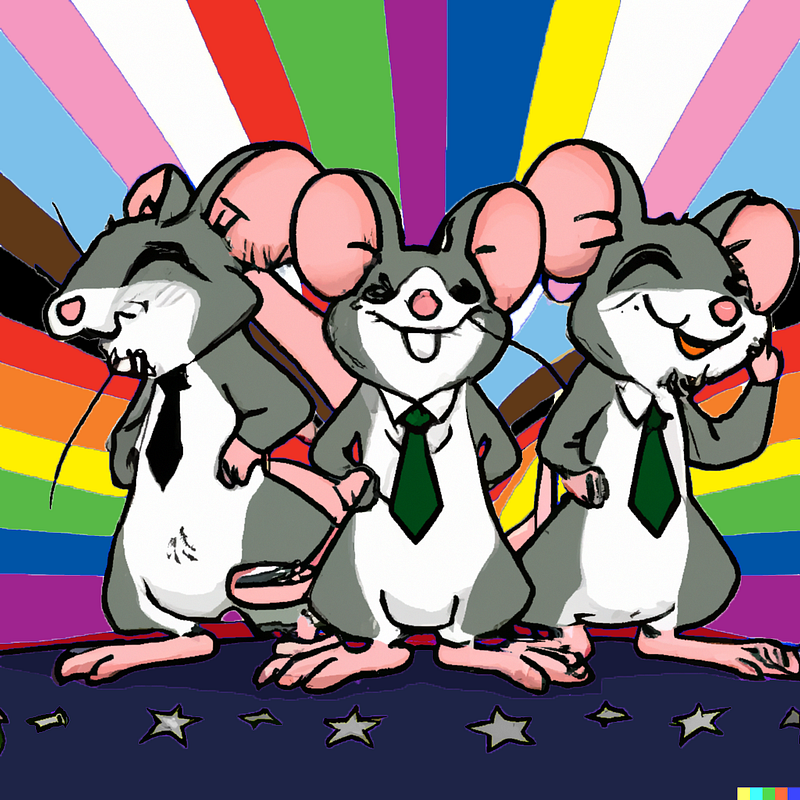I Am Not Proud to Be Transgender
I am simply transgender


Today — June 1 — marks the beginning of Pride Month 2023, a nebulous period both for those in the rainbow community as well as out.
For those outside the rainbow, Pride Month is viewed as a time to acknowledge your LGBTQ peers and ancestors. Support ranges from well-intentioned to clumsy. At the personal level, Pride Month has been equated to being gothic on Halloween, with comments similar to “This month, you don’t need to be ashamed of your sexuality or gender!”
Thank you, I think. At least I have the remaining 11 months of the year to indulge my low self-worth.
At the industry level, half-hearted participants of Rainbow Capitalism drop gems like a rainbow-colored IBM logo. Nothing says “progressive” like the oldest, most staid American company paying lip service to diversity as “IBM attire” endures unofficially within the culture.
But for those of us inside the rainbow, what does Pride Month mean? We must have a reason to celebrate it. Perhaps the meaning is to be found in its name — Pride. What is pride and why is it applied to the LGBTQ community in particular?
In a time of uncertainty and a month with uncertain meaning, I am certain of one thing.
I am not proud to be transgender.
A rose by any other name
Words are important; definitions are important. Human relationships — war and peace — depend on words. Humans create words to describe human experience — real or imagined. But words have meanings — they must or communication is impossible.
For example, common misunderstanding of the relationships among sex, sexuality, and gender impacts the transgender community daily. The distinction between a species-level biological abstraction (sex) and one’s daily personal implementation (gender) should be obvious, but is not — even within the transgender community!
Unfortunately, the word “pride” is laden with definitions. One definition includes both “reasonable self-esteem” and “exaggerated self-esteem.” This poor definition covers the entire gamut of human self-worth.
Included in this definition are muted shades of accepting your place of birth — “I was born in Puerto Rico.”
Also included in this definition are eye-watering neon explosions of hubris — “Imma shoot my car to Mars, bitches!”
These two aspects of human experience are different in more than magnitude; they are different in kind. The former aspect accepts the metaphysically given, such as physical structure, biochemistry, parents, place of birth. The latter aspect rejects the interdependence of a greater whole to elevate acts that screw over the Universe.
At the risk of offending the group of billionaires currently shooting their car to Mars as well as reading this article, I don’t want to be a part of the latter group.
I don’t take pride in my gender as a middle finger to the Universe.
But I also believe the word “pride” does not cover the former group. Pride is not self-esteem. Pride is more than that.
My rose is better than yours
The remaining definition given is “pleasure that comes from some relationship, association, achievement, or possession that is seen as a source of honor, respect, etc.” It is simple to trace a path from pleasure of achievements or possessions to an exaggerated sense of self-esteem.
Western society rewards the type of behavior exemplified by bombastic wealth — say, shooting your car to Mars — and contributes further to the exaggeration. Western society upholds mythical creatures of industry (such as the founder of IBM) as an ideal almost certainly not attainable by the majority of global population.
In contrast, there is no accomplishment in the metaphysically given. These are factors beyond our control, such as our genetics, our biochemistry, the long history of the society at our place of birth. We do not choose those characteristics.
I did not choose my sex. I did not choose my gender. I have chosen the daily external implementation of my gender as it fits in the society around me.
And although I appreciate how I look and present, there can be no exaggerated self-esteem in what we are given. When a sense of accomplishment in the metaphysically given does arise, the result is the most toxic human behavior in history: discrimination.
Exaggerated self-esteem is the origin of racism, sexism, and imperialism.
Exaggerated self-esteem ends with people screaming “‘Murica, fuck yeah!” to destroy rain forests for parking lots.
Exaggerated self-esteem leads to the underdog being oppressed into continuing the role of underdog indefinitely.
I do not want pride in my gender in that sense, either.
Is Pride Month the same as LGBTQ History Month?
In response to exaggerated self-esteem and its products, Western society erects memorials. In the United States, we have Black History Month, Women’s History Month, Asian Pacific-American Heritage Month, among others.
Pride Month, however, is not LGBTQ History Month. As a stark reminder, there is no “.gov” website for Pride Month, unlike the three links above. To be clear, the US government recognizes Pride Month, but more at the level IBM does.
The distinction in my mind is that being Black, a Woman, or Asian Pacific-American is typically directly perceivable. On average across global population, relatively little effort is required to guess whether to include a random human in those categories.
But sexuality and gender are invisible characteristics held by members of smaller minorities. Our ability to hide — at times for purposes of survival — has been used as a weapon against the LGBTQ community to imply we choose to be members.
Further, homosexual and gender non-conforming people have contributed to history — even to White European history — since time immemorial. The history of the world is the history of the LBGTQ community, despite efforts to erase the private activities of otherwise admirable people.
As a result, the slurs, the phobias, the discrimination — they appear more innocuous. When you cannot determine if the target of your hate is standing next to you, tongues loosen.
After all, it’s those other people, right? Not present company, of course. We seem all right.
Pride (in the name of purple)
If there is no pride in the metaphysically given, why do we need Pride Month? What can we in the LGBTQ community be proud of? What is the meaning of pride in this context?
In a word: co-existence.
We in the LGBTQ community can and should be proud that — as the underdog in the battle among people with an exaggerated sense of self-worth due to skin color, annual salary, and genitalia — we manage to survive.
The LGBTQ community faces continuous persecution. We are different. We are others.
Commentators as venerable as Kermit the Frog noted “It’s Not Easy Bein’ Green.” With respect, Kermit, imagine being any color of the rainbow!
We do not require the reasonable self-esteem of the first definition of pride. We require the esteem of the rest of society — enough to be able to live.
I am still unsure whether Pride Month assists me in my struggle for daily self-worth or paints another target on my back. I find it disappointing that we must call out to society to embrace justice and equality. I find it alarming that Western society needs to shoehorn these concepts into a daily barrage of shooting cars to Mars and its ilk.
I am not proud to be transgender. But I am proud to be transgender and capable of living in this society.
It’s not easy being rainbow.
Happy Pride Month, everyone.




